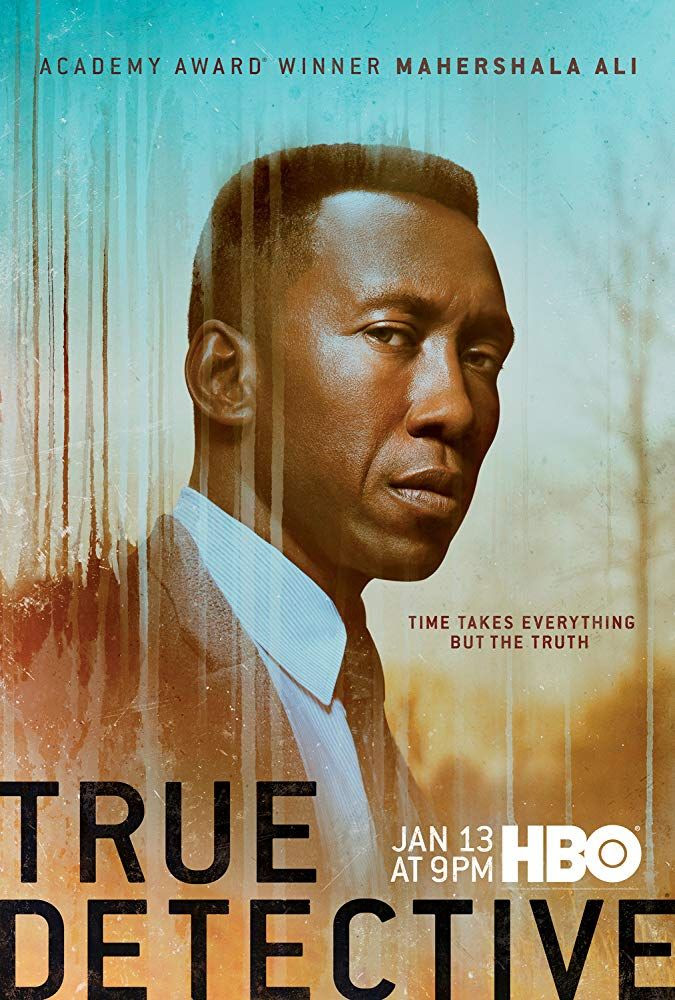
Hats off to True Detective for providing in its season 3 finale something you don't see in a kind of story like this. Not in any television series or movie I've ever seen, certainly not in the previous two seasons of True Detective, and, come to think of it, not in any novel I've ever read, either. Imagine Jude the Obscure with a happy ending. That's what we got in True Detective tonight.
It's not clear if Hays will remember the joy he discovered, the healing of something that was so bad for so long, finally turning out well and beautiful. Hays comes to realize this, and his vision of his wife Amelia, says this to him, a little after he and West stand at the grave of Mary July - aka Julie Purcell - and West says he doesn't feel any closure. They then cross paths with a little girl, and her father, a gardener at the convent, and we had to know this encounter was very significant, even though we couldn't know exactly why. After all, the girl's name was the same as Julie's mother: Lucy.
But Hays realizes the truth, and drives to Julie's place, and even though he forgets why he's there, that's an incredible kind of closure and happy ending for us, the audience. And it will be for him, too, eventually. His son has Julie's address, which means that, someday, he'll tell his father what happened and what's going on. (Yeah, I expect Hays to live that long, and be more or less compos mentis.)
This season of True Detective was a masterpiece of misdirection. It was great to see Cohle and Hart in that newspaper, as I said last week, but the villain in season 3 was, after all, not some heinous child predation ring. It was Hoyt's daughter, protected by Hoyt, and the motive was motherly love. This doesn't negate the horror and pain of the kidnapping - it's a twisted kind of motherly love - but it's a very different kind of emotion than what we saw wild and perverse in the first season. Indeed, ultimately, the most consistent thing in the first and third seasons was the superlative acting of Matthew McConaughey and Mahershala Ali, and, for that, matter Woody Harrelson and Stephen Dorff, too. (Ali won an Oscar for best supporting actor tonight - he surely deserves an Emmy for best actor next time those awards are given.)
At least one big loose end: unless I missed it, I still couldn't tell you what happened to Amelia. Maybe we'll learn more about that in a subsequent season. Until then, thank you True Detective for a story and an ending like no other.
See also True Detective 3.1-2: Humanistic Disturbances of the Soul ...True Detective 3.3: Unquestioned Witnesses ... True Detective 3.4: All Hat, No Answers ... True Detective 3.5: Tour de Force Scene in the Present ...True Detective 3.6: Great Conversations ... True Detective 3.7: Merge!
And see also Season Two: True Detective: All New ... True Detective 2.2: Pulling a Game of Thrones ... True Detective 2.3: Buckshot and Twitty ...True Detective 2.4: Shoot-out ... True Detective 2.7: Death and the Anti-Hero ... True Detective Season 2 Finale: Good Smoke but No Cigar
And see also Season One: True Detective: Socrates in Louisiana ... True Detective Season One Finale: Light above Darkness

philosophic crime fiction: The Plot to Save Socrates

philosophic crime fiction: The Plot to Save Socrates
2 comments:
Great review. Appreciate the insight of the rare happy ending (though I thought Season 1 ended on an up note). I have a different take on this ending though. I think Purple passed away in those final 3 scenes. Seeing the kids on the bike appeared to trigger a moment of awareness as he looked at us (the viewer). Our perspective then moved into his eye (his head?) as he remembered the pivotal moment in his life when he decided to marry Amelia. That scene faded to white (which to me denoted his passing). The final scene of him on recon in the jungle struck me as his most internal, where he was most comfortable (primal?), where his mind would go at its end.
I'm not sure I agree with that interpretation, but it's well rendered and certainly has its own poetry. In any case, glad you enjoyed the review!
Post a Comment